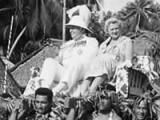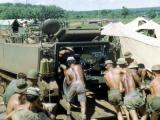As well as a record six individual world titles between 1968 and 1979, including three in a row from 1968 to 1970, Mauger also won the long track world championship three times between 1971 and 1976.
1970s
Events In History
Carless days for motor vehicles were introduced to combat the second ‘oil shock’ (petrol shortage) of the 1970s. They did little to reduce consumption and were scrapped in May 1980.
In 2008 the well-known sports writer Joseph Romanos chose the victory of the 1972 rowing eight as the best team performance by New Zealanders at an Olympic Games.
Long-haired Christchurch mountaineers John Glasgow and Peter Gough became the first people known to have scaled the 2000-m Caroline Face of Aoraki/Mt Cook. They declared it a ‘triumph for the hippies’.
Articles
Waitangi Day
Every year on 6 February, New Zealand marks the signing of the Treaty of Waitangi in 1840. For most people, Waitangi Day is a holiday; for many, and especially for Māori, it is a time for reflecting on the Treaty and its place in modern New Zealand. Read the full article
Page 5 - Waitangi Day 1970s
Waitangi Day, a public holiday from 1974, briefly became New Zealand Day in the 1970s. Increasingly, it became a focus for Māori protest
Viceregal visiting

'To be invisible is to be forgotten,' constitutional theorist Walter Bagehot (1826–77) warned. For the King or Queen's New Zealand representative, the governor-general, that meant hitting the road Read the full article
Page 4 - Some say yes; some say no
Like his predecessors, Sir Denis Blundell (1972–7) travelled widely throughout New
1981 Springbok tour
For 56 days in July, August and September 1981, New Zealanders were divided against each other in the largest civil disturbance seen since the 1951 waterfront dispute. The cause of this was the visit of the South African rugby team – the Springboks. Read the full article
Page 4 - Stopping the 1973 tour
Keeping sport and politics separate was becoming increasingly difficult. In July 1969 HART (Halt All Racist Tours) was founded by University of Auckland students with the specific
Vietnam War

The Vietnam War was New Zealand's longest and most controversial overseas military experience. Although this country's troop commitment and casualties were modest, the conflict aroused widespread protest and condemnation. And for those who fought in Vietnam, it was a tough homecoming. Read the full article
Page 1 - The Vietnam War
The Vietnam War was New Zealand's longest and most controversial overseas military experience. Although this country's troop commitment and casualties were modest, the conflict
The 1970s
The 1970s were an era of economic and social change. Global oil shocks hit the New Zealand economy hard, while protests against the Vietnam War and nuclear testing continued. A new generation of activists raised questions about race relations, sexuality and the welfare system in New Zealand. Read the full article
Page 1 - The 1970s
The 1970s were an era of economic and social change. Global oil shocks hit the New Zealand economy hard, while protests against the Vietnam War and nuclear testing continued. A
Page 2 - Overview
Summary of what NZ was like in the 1970s, including our population, economy, popular culture, protest issues, politics and sporting
Page 3 - 1970 - key events
A selection of key events from
Page 4 - 1971 - key events
A selection of key events from
Page 5 - 1972 - key events
Selection of key events from
Page 6 - 1973 - key events
Selection of key events from
Page 7 - 1974 - key events
Selection of events from
Page 8 - 1975 - key events
A selection of key events from
Page 9 - 1976 - key events
A selection of key events for
Page 10 - 1977 - key events
A selection of key events from
Page 11 - 1978 - key events
A selection of key events from
Page 12 - 1979 - key events
A selection of key events from
Page 13 - Further information
Books and website links related to New Zealand in the




















































